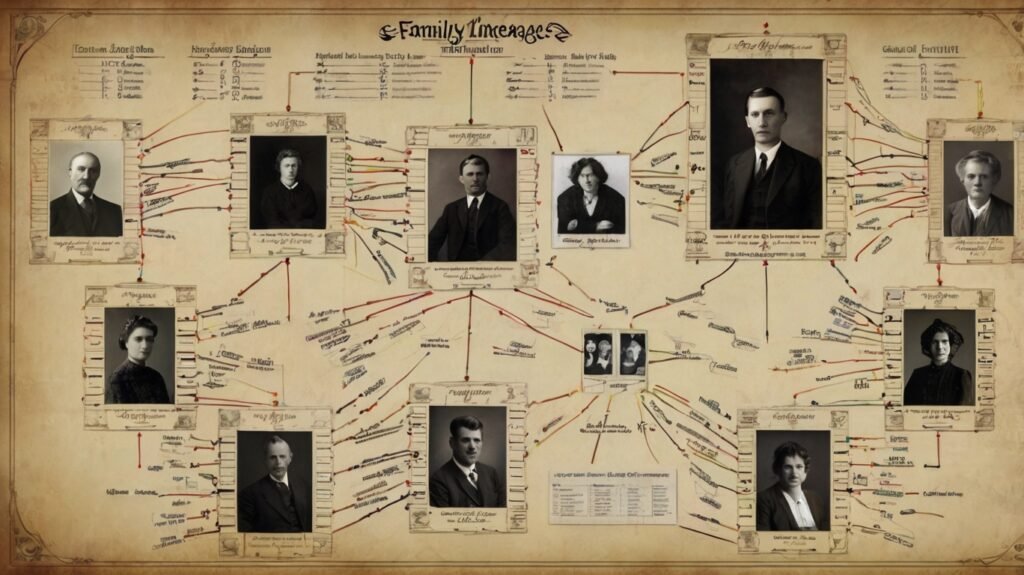The origin of surnames: from nicknames to family identities.

Introduction to Surnames
Surnames, often referred to as family names or last names, represent an essential component of personal identity in societies worldwide. They serve as identifiers that can convey various aspects of an individual’s background, including their lineage, ancestry, and even cultural heritage. The significance of surnames transcends mere identification; they also play a crucial role in social structures, legal matters, and genealogical research.
Throughout history, surnames have evolved from simple nicknames derived from an individual’s occupation, geographical location, or characteristics to more established forms that reflect familial ties. The use of surnames can be traced back to ancient civilizations, with variations appearing across continents. In many cultures, surnames are passed down from generation to generation, solidifying family identity and heritage. This tradition fosters a sense of belonging and connection among relatives.
Globally, surnames can be categorized into several types, including patronymic surnames, which are derived from a father’s name; matronymic surnames, originating from a mother’s name; descriptive surnames that refer to physical attributes or personal attributes; and occupational surnames that denote one’s profession. For instance, names like “Smith” indicate a blacksmith by trade, while names like “Fisher” relate to those who fish. Cultural differences also manifest distinctly in surname practices; for example, some cultures adopt the mother’s surname alongside the father’s surname, exhibiting a unique approach to familial naming conventions.
Understanding surnames is not merely an academic pursuit; it offers rich insights into human history, social dynamics,and the ways in which names can influence personal and collective identities. As we delve deeper into the origins and diversification of surnames, we uncover the fascinating journey they have undergone throughout the centuries, shaping our understanding of identity and lineage.
The Historical Context of Surnames
The development of surnames has a rich historical context that reflects the evolution of human society. Initially, names were often simple identifiers relating to a person’s given name, occupation, or a notable characteristic. In ancient civilizations, such as those of Mesopotamia and ancient Egypt, individuals were assigned names that denoted their lineage or place of origin. This practice laid the groundwork for what would later evolve into more complex surname systems.
By the Middle Ages in Europe, the use of surnames became more standardized, driven by various social changes. The rise of feudalism necessitated a need for clear identification among the growing population. As lands were divided and property ownership became more rigid, surnames began to signify familial ties and inheritance rights. This shift marked the transition from transient nicknames to permanent family identities. Occupational surnames emerged during this time, reflecting the growing importance of trades and professions. Names such as Smith, Baker, and Carpenter not only indicated an individual’s job but also served as a means of social recognition within communities.
Geography also played a critical role in surname formation. Surnames often derived from local landmarks or geographical features. For instance, surnames like Hill or Woods could indicate a family’s residence near such features. Similarly, regional influences contributed to variations in surnames across different areas, creating a diverse tapestry of family names based on local customs and dialects.
This historical context underscores how surnames evolved from basic descriptors to significant markers of family identity. The development of surnames reflects broader societal changes, highlighting how social structures, occupations, and regions shaped the way individuals were identified within their communities. Today, while surnames are commonplace, their historical origins remain a testament to the complexities of human culture and identity.
From Nicknames to Surnames

The transition from informal nicknames to formal surnames marks a significant evolution in the way individuals and families identify themselves. Initially, surnames originated from nicknames derived from personal characteristics, occupations, or geographic locations. For instance, in medieval Europe, individuals often referred to one another by features such as height or hair color, leading to nicknames like “Brown” for someone with dark hair or “Short” for a smaller person. These descriptive names served as practical identifiers in societies where many people shared the same first name.
As populations grew and communities expanded, the necessity for more distinct identifiers became apparent. The burgeoning complexity of social interactions and administrative requirements prompted the formalization of these characteristics into hereditary surnames. By the 13th century in England, the use of surnames became more common as a means to track lineage and property ownership. For instance, the surname “Smith” indicated someone who worked with metal, originating from the Old English word “smitan,” which translates to “to smite” or “to strike.” As the class distinctions and governance structures solidified, family names were increasingly recognized as markers of identity, differentiating individuals within the same societal sphere.
Furthermore, societal norms began to shift, leading to the adoption of permanent surnames among the gentry and emerging middle classes. Historical records indicate that during the Norman Conquest of 1066, the introduction of surnames was expedited, as the ruling classes required a system that delineated landowners and their heirs. By the 14th century, it became customary for most individuals to adopt surnames, bridging the gap between informal nicknames and formalized family identities. Over time, the evolution encompassed various cultural influences, culminating in unique surname traditions globally, each rooted in distinct historical narratives.
Types of Surnames and Their Meanings
Surnames can be categorized into several distinct types, each with its own meaning and historical context. Understanding these categories offers insights into the personal, familial, and social identities that surnames convey.
One common type of surname is patronymic surnames, which are derived from the father’s given name. These surnames often include a suffix indicating “son of” or “daughter of.” For example, the surname “Johnson” translates to “son of John,” while “MacDonald” means “son of Donald” in Gaelic. This tradition emphasizes paternal lineage and emphasizes the importance of fathers in many cultures.
Conversely, matronymic surnames are less common and derived from the mother’s name. Examples such as “Maddox,” which can mean “son of Matilda,” exemplify how maternal lineage has occasionally played a role in surname formation. While historically less prominent, matronymic names reflect the significant contributions of women within familial legacies.
Locational surnames denote geographic origins, often derived from the name of a town, village, or geographical feature. For instance, “Hill” may indicate someone who lived near a hill, while “Brooks” refers to those residing near a brook or stream. These surnames provide insights into ancestral habitation and movement.
In addition, occupational surnames indicate the profession or trade of an ancestor. Surnames such as “Smith,” which refers to a metalworker, and “Baker,” signifying someone involved in baking, reveal their bearers’ historical occupations and societal roles. These names serve as a link to the skills and contributions that shaped communities.
Finally, nickname-based surnames originated from personal attributes, physical characteristics, or behavior. For example, “Brown” may denote someone with brown hair or skin, while “Swift” could describe a fast individual. These names often reflect the identity or reputation of the person at the time of naming.
Each type of surname encapsulates a rich narrative, offering a glimpse into historical context, familial connections, and societal roles that influenced identity formation across generations.
Geographical Influence on Surnames

The impact of geography on the formation of surnames is profound, reflecting the various historical, cultural, and linguistic factors inherent in different regions. In many cases, surnames arose from the environments in which families lived, often providing insights into their occupations, characteristics, or affiliations. For instance, in England, surnames such as ‘Hill’ or ‘Brook’ denote geographical features, suggesting that early bearers of these names lived near these landmarks. This practice exemplifies how landscapes influenced over time the identities of individuals and their families.
Similarly, surnames that originated in other parts of the world showcase regional characteristics. In Spain, the use of ‘de la’ or ‘del’ indicates a connection to specific places, with names such as ‘De la Cruz’ often linked to particular localities or religious sites. This highlights how geography not only influenced surnames but also created ties to cultural heritage. As families migrated or settled in different areas, they often adapted their surnames to reflect their new surroundings. This dynamic transformation led to a rich tapestry of surnames that encapsulate both personal identity and the essence of place.
Language also plays a significant role in shaping surnames across various regions. For instance, in Scandinavian countries, individuals commonly adopt surnames like ‘Olsen’ or ‘Andersen,’ indicating lineage by incorporating elements of language that denote family ties. This custom illustrates how language intersects with geography, enriching the understanding of family identities throughout history.
In essence, the evolution of surnames is deeply intertwined with geography, revealing the interconnectedness of cultural and linguistic influences. As societies grew and changed, so too did the surnames that identify them, forming a historical record that continues to provide insight into human relationships and societal structure. Through examining these geographical influences, one can appreciate the complexity of surname origins and the stories they tell about our shared past.
Cultural Variations in Surname Usage
The use of surnames varies significantly across cultures, reflecting deep-rooted traditions and societal norms. In many Western cultures, surnames are primarily hereditary, passed down from one generation to the next, typically following the patrilineal line. This lineage-driven approach signifies a family’s heritage and is often reflected in social identity. However, the practice of surname usage is far from uniform; regions such as Spain and Latin America exhibit unique traditions that challenge this norm. In these cultures, it is common for individuals to adopt both their father’s and mother’s surnames, an approach that emphasizes maternal lineage and reflects a commitment to family unity.
Marriage often provides another lens through which to view surname practices. In several societies, it has traditionally been customary for a woman to adopt her husband’s surname upon marriage. This practice symbolizes a transition from one family identity to another. Nevertheless, contemporary perspectives challenge this tradition, prompting many women to retain their maiden names or choose hyphenated surnames, thereby representing their individual identity alongside their marital affiliation. Such evolving practices reveal shifts in cultural values towards gender equality and the recognition of women’s contributions within the family unit.
Furthermore, naming conventions vary widely; in some cultures, surnames can be more fluid. For example, in parts of India, individuals may use their father’s first name, combined with familial or caste indicators, as a surname, which aligns with local customs and societal structures. Meanwhile, in Iceland, surnames often reflect the father’s first name with the addition of “son” or “dóttir,” demonstrating a patronymic system. Such naming conventions reveal the diversity of cultural identities and values, illustrating how surname usage goes beyond mere identification, serving as a tapestry of heritage, familial ties, and societal norms.
The Role of Surnames in Family Identity

Surnames play a crucial role in the formation and expression of family identity. They serve not just as identifiers for individuals, but also as intricate links to the wider family lineage and heritage. Each surname encapsulates a wealth of stories, traditions, and histories that define familial connections across generations. As families evolve and expand, surnames remain a constant, providing a sense of belonging and continuity.
The connection between surnames and ancestry is significant. A surname can often reveal a great deal about one’s family history, including geographical origins, occupations, and even social status. For instance, names derived from occupations such as “Baker” or “Smith” can denote professions of ancestors, while geographic surnames like “Hill” or “Brook” can indicate the places from which families originated. This aspect of genealogy is invaluable, as it enables individuals to trace their lineage and understand their roots better, fostering a sense of pride and identity within families.
Moreover, surnames can impact social standing and recognition within communities. They often carry connotations that can influence perceptions and relationships. In some cultures, the lineage and history associated with a surname can dictate familial responsibilities, social expectations, and even marital prospects. This connection to surname heritage often shapes how individuals are viewed by others, impacting their position within various social contexts.
As we navigate further into modernity, the roles of surnames continue to evolve, adapting to cultural changes and societal norms. However, their fundamental importance in reinforcing family identity and heritage remains. By recognizing the significance of surnames, individuals can immerse themselves in the narratives that shape their identities and contribute to a collective family history that is cherished and preserved through generations.
Modern Trends and Changes in Surnames
The landscape of surnames is evolving in response to societal changes, particularly in the realm of globalization and shifting cultural norms. One notable trend is the increasing use of hyphenated surnames, which allows individuals to preserve their family heritage while also acknowledging the identity of their partner. This practice reflects a broader commitment to inclusivity and recognition of diverse backgrounds. Couples may choose to hyphenate their names upon marriage, creating a unique family identity that combines elements from both partners’ lineages.
Additionally, names are being reevaluated following personal choice, such as through legal name changes. Individuals may opt to discard surnames that they feel no longer represent them, often choosing names that resonate more with their personal identity or beliefs. This trend signifies an active attempt to reshape one’s identity in a manner that aligns with contemporary values, thus breaking away from historical constraints surrounding surname lineage.
The influence of globalization also plays a pivotal role, as migration and multicultural interactions lead to a blending of traditional naming conventions. People from different cultures may adopt or adapt surnames to better fit within a new community, leading to the emergence of innovative surname forms. For instance, an individual with a Matronymic surname may choose to combine or modify it to align with local customs, further enriching the tapestry of cultural identities associated with surnames.
Moreover, there is a growing awareness of gender fluidity that influences surname conventions, as more individuals seek to create names that accurately reflect their identity beyond the binary. As social acceptance of various gender identities continues to evolve, so too will the surnames associated with these identities, further driving the change in contemporary naming practices. Consequently, this ongoing transformation highlights not only the fluid nature of identity but also serves as a reflection of broader societal shifts.
The Future of Surnames

The evolution of surnames has provided a fascinating glimpse into the ways social structures, cultural shifts, and personal identities intertwine. Initially birthed from nicknames, professions, or locations, surnames have transformed over centuries into significant markers of lineage and family heritage. As we have explored, surnames serve not only as identifiers but also as historical records that encapsulate familial narratives and societal transformations.
Looking to the future, it is evident that the significance of surnames will continue to evolve. With globalization advancing rapidly, cross-cultural interactions are becoming more prevalent, leading to a blending of surnames and family identities. In many cultures, individuals are now adopting hyphenated or dual surnames, reflecting parentage more equitably and challenging traditional conventions. This trend signifies a shift towards inclusivity and recognition of diverse family structures.
Technological advancements also play a critical role in shaping the future of surnames. Digital databases and social media platforms enable individuals to discover and connect with familial ties that might have remained obscure in the past. As people delve deeper into genealogical research, there is a growing appreciation for the stories behind surnames, fostering a renewed interest in family history. This phenomenon encourages individuals to reflect on their own surname stories, adding layers of meaning to what once might have been considered merely a designation.
Moreover, changing societal norms regarding marriage and identity present new considerations for surname use and family naming conventions. As society continues to embrace more progressive views surrounding gender and personal identity, we may see even more diverse practices regarding surnames, profoundly affecting how future generations perceive and carry their family names.
Ultimately, while surnames have a rich historical context, their future lies in the continuing evolution of identity, culture, and societal values. How individuals and families navigate these changes will shape the significance of surnames in the years to come.
0 Comments